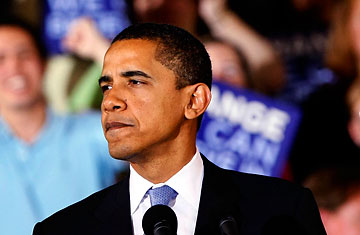
Democratic presidential candidate Sen. Barack Obama speaks at a primary rally at North Carolina State University on May 6
As he walked across the tarmac towards a flight home to Chicago late Tuesday evening after 48 hours of heavy campaigning in North Carolina and Indiana, Barack Obama had a message for Hillary Clinton's voters. "As tough as this contest has been, we're one party with a shared vision of where the country needs to go. And, you know, I think that we have to let the contest play out, but my firm commitment is to make sure that we are unified in August at the convention and we're unified in November."
Political candidates usually get to wait until they're elected before their campaign commitments are tested, but in this case Obama won't have that luxury. Despite his talk of bringing Americans together, his outreach to blue-collar voters and even the North Carolina victory he had under his belt as he boarded the plane that evening, despite all of that, Obama could at best hope that between now and August he will take the leadership of a deeply divided party.
The contests ahead will not help. After her dispiriting, two-point victory in Indiana, Clinton seems to have a lock on two of the next three primaries, in West Virginia and Kentucky, which have strong contingents of older and blue-collar voters that play to her strengths. Obama is expected to fare better in the West, in states like Oregon, Montana and South Dakota, but those will require work. And Clinton is in a strong position in Puerto Rico.
Still, the delegate math is strongly against her, and the Obama campaign knows it. So while they'll need to press the flesh and respond to attacks, their more important tasks are stepping up pressure on superdelegates to declare support for Obama; talking past Clinton to their presumptive next competitor, John McCain; and starting to move into general election mode, visiting states that are not on the ever-diminishing primary calendar, but are critical for victory in November.
The superdelegate push has already begun. Campaign strategist David Axelrod said on the flight to Chicago that the message to them was, "Read the newspapers." He said the campaign expected more supers to announce in coming days, and that they would be reaching out to them. One North Carolina undecided superdelegate said last week before the vote that he would go with his district, and the Obama camp expects several in that state and elsewhere to come forward in the next few days.
Obama has already begun politely talking past Clinton. In his victory speech in Raleigh he had gentle, even respectful things to say, surprising even his own staffers by appearing to concede Indiana just as the race was beginning to close. He even solicitously implied Clinton might still win the nomination. But being nice to a competitor is almost worse than attacking them, since it implies they no longer really pose a threat. His attacks on McCain, by contrast, have grown sharper. "We know what's coming," from the Republicans, he said. "I'm not naive, we've already seen it." And he again hammered McCain for carrying on what he called George W. Bush's "failed" policies.
That, of course, is only one part of the campaign's acting as if it's already engaged in a general election. Obama will travel to non-primary states, says Axelrod. It will mobilize its nationwide grassroots organization to start targeting McCain. And, says Axelrod, "We're going to spend time addressing broader issues," such as foreign and national security matters and (though Axelrod and communications aide Robert Gibbs denied it Tuesday) beginning the search for a vice presidential candidate.
While the Democratic party—and the rest of the country—may be reeling at the idea of another month or more of primary bloodshed, Obama has been doing his best to appear above the fray. While he was losing, and while the Wright scandal was erupting, that made him look at best removed from reality, and at worst aloof. But in the wake of his victory in North Carolina and his near miss in Indiana, that studied nonchalance may start to come across as a kind of victor's confidence.
Maintaining that coolness after the Indiana loss may be tough in the light of day, as it was the result of a major tactical gamble by the campaign. From April 27, Obama ceded the state's northwest, which ended up deciding the race to the Clinton camp. Instead, Obama focused the last six of his seven visits over as many days in Indianapolis and the wealthy and populous suburban counties around it. The campaign was acting on the advice of state aides who, as advisers to gubernatorial candidates in past election years, had won the northwest but lost the Indianapolis suburbs—and with them, the elections. The bet this time was the Obama would carry the northwest because it was so close to Chicago, but Clinton launched a tough, sustained campaign and won all but one of the counties. By contrast, Obama won only two of the seven surburban Indianapolis counties he targeted so intensely.
But Obama maintained his composure on the flight, even as the decision in Indiana itself remained up in the air. Campaign aides asked the cockpit to call ahead to the control tower to see if they could pass on results. (They couldn't.) As the plane approached Chicago, Obama's friend Eric Whitaker got early and incomplete CNN numbers on his BlackBerry and Robert Gibbs passed them along to Obama. Obama nodded and said, "Good job." He did not appear concerned enough with final results, however, to wait around. He and Michelle got off the plane and into the car before the final call was made for Hillary Clinton in Indiana by a slim margin.
